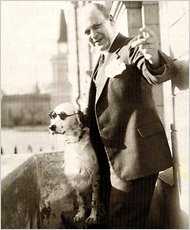BERLIN — The case of the businessman who taught his dog to raise his paw at the command “Hitler” may never go down in the annals of Third Reich history as consequential, but it has given people here a reason to laugh, not at the nation’s sinister deeds but at those who were responsible.
 |
|
TAMRA GROUP IMAGE BANK, VIA ASSOCIATED PRESS
|
| Tor Borg and his dog Jackie. The dog had been trained to react to the command 'Hitler" by raising a paw. |
Nearly 66 years after the end of World War II, Germany’s Nazi past continues to reveal itself here in ways large and small, and on an almost regular basis, often shedding new light on the unique crimes of those who ran the Third Reich and those who came to power after its fall.
The case of the dog owner the Nazis wanted to prosecute for training his canine to mock the Führer was revealed at the same time Germans learned their intelligence service knew where Adolph Eichmann, architect of the Holocaust, was hiding as early as 1952, eight years before the Israelis captured him.
The combined reports in national newspapers led last week to yet another round of Nazi-related headlines, though the one about the dog offered the unusual respite of a Nazi-era action that sounded like a punch line. The Eichmann revelation was important because it added a date to a fact historians here said was already known.
“The dog affair tells us the Nazis were not only criminals and mass murderers, they were silly as hell,” said Klaus Hillenbrand, a historian and author who has focused on the Nazi era and uncovered the case in federal archives. “There are very few things you can laugh about because what they did was so monstrous. But there were two or three dozen people discussing the affair of the dog rather than preparing for the invasion of the Soviet Union. They were crazy.”
The dog’s name was Jackie.
It was 1941, shortly before the invasion of the Soviet Union, and an anonymous source tipped off the Nazi authorities: A businessman named Tor Borg, of Tampere, Finland — a country that was friendly to the Nazis but not occupied by the Reich — had a black-and-white spotted dog that he taught to mock Hitler. The German vice consul in Helsinki, Willy Erkelenz, wrote that “a witness, who does not want to be named, said he saw and heard how Borg’s dog reacted to the command ‘Hitler’ by raising its paw.”
Mr. Borg, owner of a pharmaceutical manufacturer, was apparently quite unnerved, in part because his company relied on German suppliers. “The rumor might emanate from an episode in the summer of 1933 which happened within my family only and which had no ulterior political background whatsoever,” he told the Nazi foreign office.
Mr. Hillenbrand, the historian, said he came across what he calls the dog affair in records stored on microfilm by the German Foreign Ministry when a friend tipped him to their existence. Mr. Hillenbrand said he decided to make the affair public as part of his decades of work highlighting Nazi-era crimes in books and articles, and that this was not intended to be flip.
“This is a funny story, but it is a Nazi story which tells how they were looking for enemies everywhere,” said Mr. Hillenbrand, who is also the longtime managing editor of the German newspaper Die Tageszeitung.
The other recent Nazi revelation focused on the actions of those who came to power after World War II, when the daily newspaper Bild reported that the Federal Intelligence Service knew that Mr. Eichmann was hiding in Argentina as early as 1952 — a few years earlier than previously thought. The report prompted calls for the intelligence service to make public all its Nazi-era files, which it has so far refused to do, handing records over to Bild only under court order.
But the two cases, coming on the heels of other recent revelations, served as a reminder that the Nazis were fanatical record keepers and that there are untold numbers of undisclosed documents that are certain to reveal new material long into the future.
“We will not have to rewrite the history of National Socialism, but it is indeed true that over the course of the last 20 years, a multitude of archival documents, in particular from archives of the former Eastern bloc, came to light,” said Johannes Tuchel, head of the German Resistance Memorial Center.
And those documents are likely to serve up more surprises, like the case of Mr. Borg and his canine Jackie. Mr. Hillenbrand said the documents show that Mr. Borg was summoned to the German Embassy in Helsinki where he admitted that on a few occasions his wife called the dog “Hitler” and that on a few occasions it did respond with a raised paw.
But he said, that had happened at least seven years earlier.
The Nazis did not believe him. “Borg, even though he claims otherwise, is not telling the truth,” Mr. Hillenbrand recorded in his notes of the documents.
In the end, the case went up all the way up to the Chancellery where the decision finally was made not to prosecute, for lack of credible evidence.
“This case shows that National Socialism was striving to dominate all spheres of public life and all areas that it could influence,” Mr. Tuchel said. “And that went as far as to this rather bizarre case of this dog.”
Stefan Pauly contributed reporting.
Copyright 2011 The New York Times Company. Reprinted from the New York Times, International, of Wednesday, January 12, 2011.
